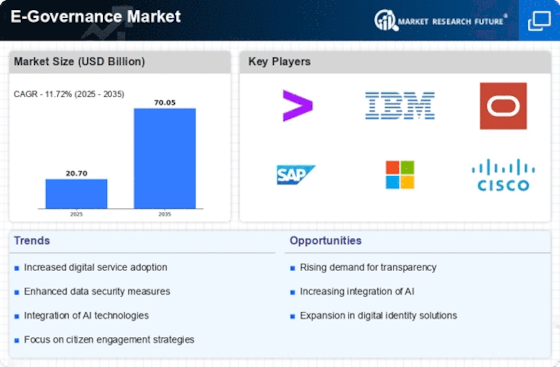Top Industry Leaders in the E governance Market
Competitive Landscape of E-Governance Market
The global e-governance market is experiencing significant growth, fueled by rising government initiatives towards digital transformation, increasing citizen demand for online services, and advancements in communication technologies. Navigating this dynamic landscape requires understanding the key players, their strategies, and market dynamics.
Key Players:
- Oracle Corporation (US)
- EMC Corporation (US)
- Metric Stream Inc. (US)
- IBM Corporation (US)
- Microsoft Corporation (US)
- SAS Institute Inc. (US)
- Fidelity National Information Services Inc. (US)
- Thomson and Reuters Corporation (US)
- SAP SE (Germany)
- Wolters Kluwer NV (Netherlands)
Strategies Adopted:
- Product innovation: Major players are constantly innovating their e-governance solutions, incorporating emerging technologies like artificial intelligence, blockchain, and internet of things (IoT) to enhance service delivery and citizen engagement.
- Strategic partnerships: Collaborations between technology companies and government agencies are common, leveraging each other's expertise and resources for project implementation.
- Focus on cloud and subscription-based models: The shift towards cloud-based solutions empowers governments with scalability, flexibility, and cost-efficiency. Subscription models provide recurring revenue streams for vendors.
- Geographical expansion: Leading players are expanding their global presence through acquisitions, partnerships, and local office setups to cater to the growing demand in emerging markets.
Factors for Market Share Analysis:
- Product portfolio and solution breadth: Offering a comprehensive suite of e-governance solutions across different domains like taxation, healthcare, and education strengthens a player's market position.
- Technological expertise and innovation: The ability to leverage cutting-edge technologies and develop user-friendly solutions is crucial for differentiation and attracting government contracts.
- Implementation experience and proven track record: A successful history of deploying e-governance projects globally builds trust and credibility with potential clients.
- Financial stability and scalability: Strong financial backing and the ability to handle large-scale projects are essential for competing in this market.
- Partnerships and ecosystem: Building strong partnerships with government agencies, technology providers, and local players expands reach and expertise.
New and Emerging Companies:
The e-governance market is witnessing the emergence of innovative startups providing niche solutions. These companies often specialize in areas like data analytics, artificial intelligence-powered citizen engagement tools, and cybersecurity solutions. They leverage their agility and focus on specific areas to cater to evolving government needs and gain a foothold in the market.
Current Company Investment Trends:
- Investments in R&D: Leading players are increasing their R&D investments to develop next-generation e-governance solutions and stay ahead of the competition.
- Acquisitions and mergers: Acquisitions are a common strategy for expanding portfolios, acquiring specialized expertise, and entering new markets.
- Partnerships with startups: Collaborations with innovative startups enable established players to access cutting-edge technologies and cater to emerging trends.
- Focus on cybersecurity: With increasing cyber threats, companies are investing heavily in cybersecurity solutions to ensure data security and privacy in e-governance platforms.
Latest Company Updates:
December 15, 2023: Microsoft launched a new "Government Modernization Accelerator" program to help public agencies adopt cloud-based solutions.
January 9, 2024: IBM announced a partnership with the World Bank to develop data-driven solutions for improved public service delivery in developing countries.
January 17, 2024: Accenture acquired Canadian e-governance specialist Avenu Insights, expanding its digital government services portfolio.










